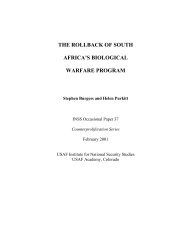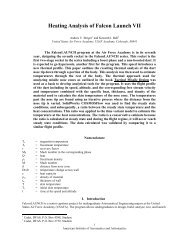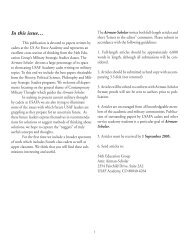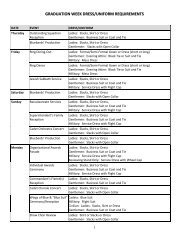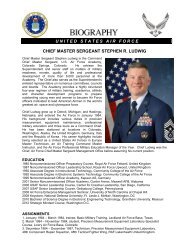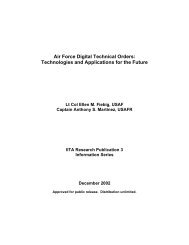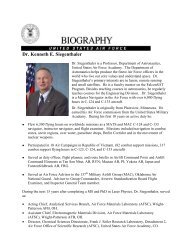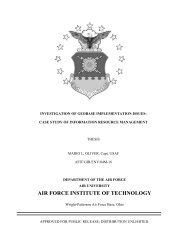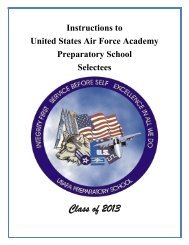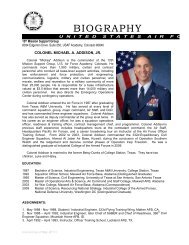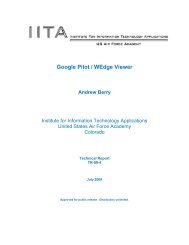Military Professionalism - United States Air Force Academy
Military Professionalism - United States Air Force Academy
Military Professionalism - United States Air Force Academy
You also want an ePaper? Increase the reach of your titles
YUMPU automatically turns print PDFs into web optimized ePapers that Google loves.
THE NATURE AND THE ETHOS OF THE MILITARY PROFESSION<br />
________________________________________________________________________<br />
Ahern, Don. “An Interview with Martin E. Dempsey.” Prism 2.1 (Dec. 2010): 151-<br />
155.<br />
http://www.ndu.edu/press/interview-martin-dempsey.html<br />
The military must assess how nine years of war and an era of persistent transparency<br />
have affected the understanding of what it means to be a professional soldier. According<br />
to Gen. Shinseki, the most important responsibility of an officer is to manage transitions.<br />
The military is currently going through a transition. Officers must preserve the military’s<br />
expert knowledge, commitment to continuing education, values, service, and apolitical<br />
stance.<br />
Allen, Charles D. “Lessons Not Learned: Civil-<strong>Military</strong> Disconnect in Afghanistan.”<br />
Armed <strong>Force</strong>s Journal 148.2 (Sept. 2010): 30-33.<br />
No matter how seemingly innocuous, the comments of senior military officers who<br />
represent the organization, the institution, and the profession, could have significant (and<br />
unintended negative) consequences. Senior leaders are strategic communicators whose<br />
words and actions count. Comments by leaders set the tone and the climate within<br />
organizations—for good and for bad—and they are never neutral. Gen. McKiernan was<br />
relieved as the commander in Afghanistan because he did not build trust with civilian<br />
leaders. Gen. McChrystal was relieved as the commander in Afghanistan because he<br />
operated outside of policy and publicly spoke negatively of the president. Both<br />
disregarded civilian control of the military.<br />
Bacevich, Andrew J. “Endless War, a Recipe for Four-Star Arrogance.” The<br />
Washington Post (Jun. 27, 2010).<br />
http://www.washingtonpost.com/wpdyn/content/article/2010/06/25/AR2010062502160.html<br />
Protracted conflicts corrode the values of popular government and the code of military<br />
conduct that honors the principle of civilian control while keeping the officer corps free<br />
from the taint of politics. American citizens need to reclaim ownership of the military by<br />
insisting that Washington abandon its de facto policy of perpetual war. Alternatively, the<br />
<strong>United</strong> <strong>States</strong> must become a nation truly at war in terms of civic obligation, fiscal<br />
policies, and domestic priorities. One of these two courses of action must be chosen or<br />
else disrespect for civilian control will continue to be shown by officers, as in the Gen.<br />
McChrystal case.<br />
4




